Pakistan - part 2
For those of you not familiar with the KKH (Karakoram Highway) here's a little bit of background.
In the 1960s and 1970s, Pakistan and China jointly constructed a road across the mountains following a branch of the Silk Road from Kashgar to Islamabad via the 4730m Khunjerab Pass. It was only in 1986 the Khunjerab Pass was opened to travellers. This engineering feat was completed by approximately 15000 Pakistanis and 20000 Chinese. Conditions were hard and deaths on both sides were extremely high.
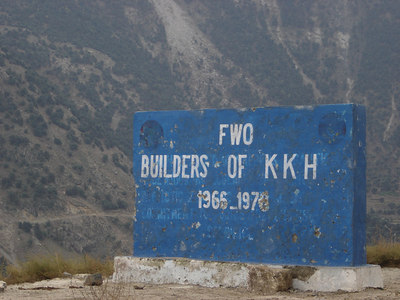 By its very nature the road needs continual maintenance. It is is a huge unending job, landslides, rockfalls, mudslides, and the crumbling slopes continually make the road impassable to traffic.
By its very nature the road needs continual maintenance. It is is a huge unending job, landslides, rockfalls, mudslides, and the crumbling slopes continually make the road impassable to traffic.
But oh the scenery, it is jaw droppingly beautiful, this highway bares witness to huge mountain ranges, (the Karakoram, Himalayan and Hindu Kush Mountain Ranges) enormous glaciers, deep ravines and valleys, and then there is continual presence of the mighty Indus River.
Our journey continues, we leave Islamabad and head to Taxilia, of course it is raining, well in fact there are thunderstorms so pull over in a service station to get out the wet weather gear, we are instantly mobbed and invited in for tea. The young man whose family ownes the service station is very interesting, highly educated and his siblings are spread all over the world, Canada, Australia and the US.
Once again there are beautiful trucks and buses everywhere, out comes the camera.
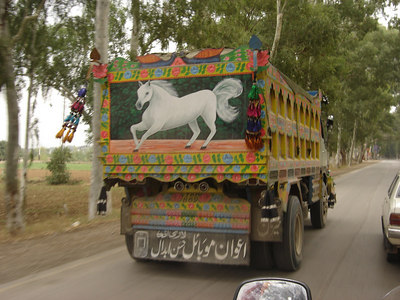
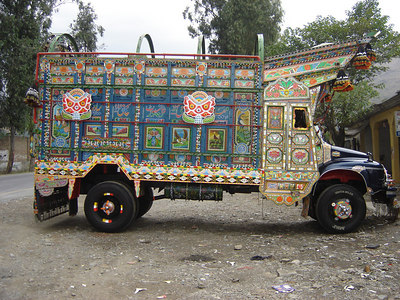
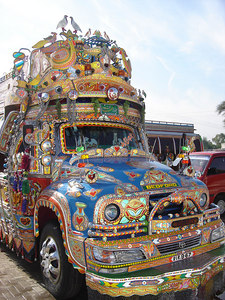
We head out through some pretty gross little villages, mud and rubbish and animals as far as the eye can see, towards Abbottabad. We call it a day at Mansehra at the reasonably clean (rat free) Karakoram Inn, complete with a good restaurant which is still open. Mansehra is probably about 60 km from the 8 October 2005 Earthquake epicentre, although it is not too badly effected and is home to many NGO and UN offices. In this photo you can see a tent school in the distance.
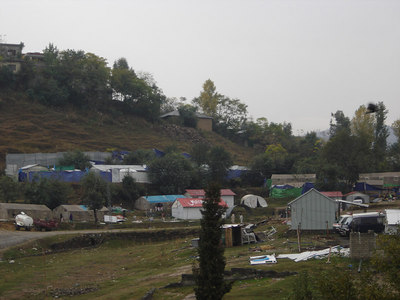
Next day onward and upward to Besham, a nice 4 hour ride (120km) through some great scenery and winding roads. We loved the terraced rice fields.
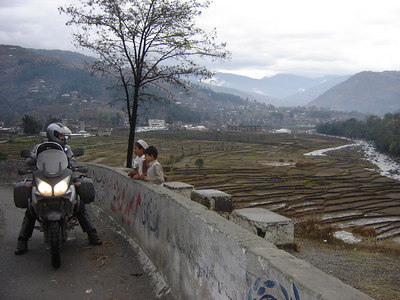
We cross the Chinese built suspension bridge at Thakot and also our first checkpoint where we once again have to fill out our details so they know where we foreigners are.
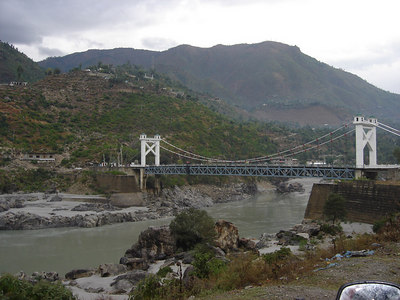
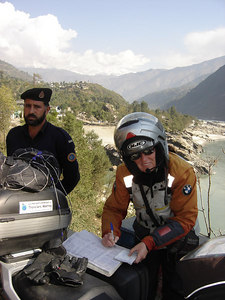
Besham is not an unfriendly town but the people in this area seem to be unanimated and expressionless. There are no smiles or the usual waves. This is the heartland of the Sunni Muslim Religion. These people are staunchly religious and unfortunately seem to have little access to education, nor do they want it. I didn't realise how much teacher I had in me. It is very upsetting to know that many of these children will never attend school, and the girls will have no opportunities. It was also in this region that we saw woman dressed in berkas. Skill gets really upset by the Berkas which he finds really awful especially for what they represent.
We have an interesting stay in Besham at the grotty Palace Midway Hotel. It is here we meet Freba. Of all the people we have met on our travels this girl is one of the most amazing. My only regret is that we could not spend more time with her and I did not take a photo of her.
Freba's story: Freba is from Afghanistan and currently living in Islamabad with her mother and sisters. Her father and brother are in Kabul with one brother studying in the US. Freba works for a German NGO trying to spread the word about Hygiene to this Earthquake affected region. Her job is almost impossible, because she is a women and the people do not want any outside influences. Only the day before we arrived there had been demonstrations in the town against all the NGOs, the leaders/agitators say that the NGO's are trying to take away their religion. More likely these local leaders fear their power base being eroded if locals listen to anyone but them.
Freba was quite adamant that she and her NGO are trying to help as she is herself a Muslim Afgan woman. "All I want is for them to learn a little about hygiene so they do not get ill" she tells us.
We asked Freba about Afghanistan which she told us was really starting to improve especially in Kabul. Life is a lot better now she says. She then told us that she was actively working for women's rights in Afghanistan, and she was the first woman of her country to participate in an Olympic Games. (Athens 2004 in Judo) Since that time she had become a public voice for women in Afghanistan, which at times made her life difficult and dangerous. But throughout all of this her family particularly her father and brothers have whole heartedly supported her. Quite uncommon I would say.
This beautifully spoken, gentle woman is a true humanitarian.
Next day is yet another glorious days ride to Chilas, the scenery just gets better and better and the road gets worse and worse. It is this section of road which apparently suffers most from landslides, fortunately we didn't come across any this day but we did encounter many animals.
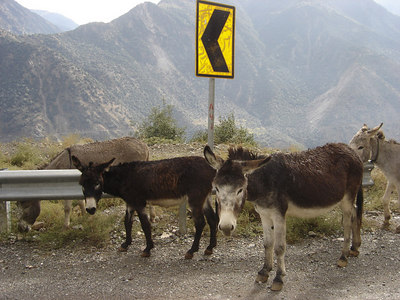
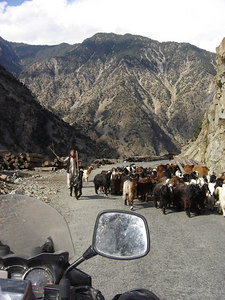
We arrive in Chilas where we stayed at the Chilas Inn, complete with beautiful gardens. We really enjoy our stay here.
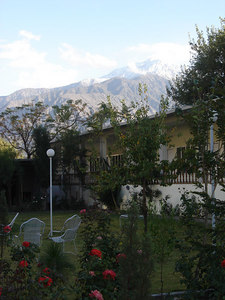
An early start next day as it is a 5 hour ride to Karimabad via Gilgit. All we can say is look at the photos. We had great sunshine and a wonderful days ride. A highlight of the day was our first view of Nanga Parbat, eighth highest mountain in the world at 8126m. We also catch a glimpse of Rakaposhi (mountain peak) shrouded in cloud.
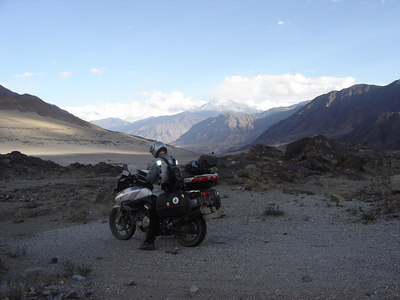
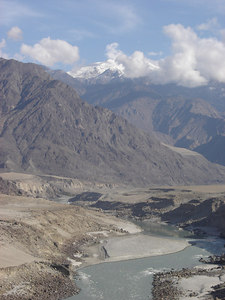
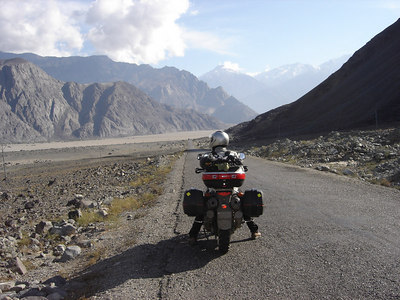
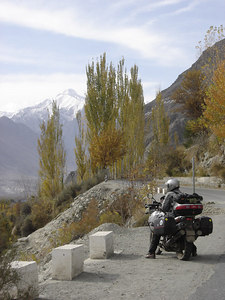
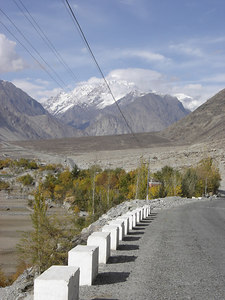
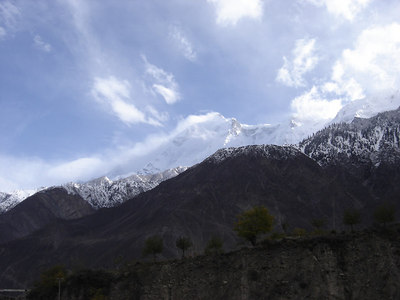
We arrive at Karimabad/Hunza and run into Marcus and John who are returning to Gilgit, only a quick chat as its getting late and then off to find a hotel. As Winter approaches many of the hotels and shops are closing. We end up at the Hilltop Hotel which has amazing views and a pleasant garden but it is very, very cold and the hot water is intermittent. Not really their fault as the power supply is very unreliable, sometimes in winter it can go off for weeks at a time. They do have their own generator (supplied by a foreign government) which helps. We end up having three blankets on our bed and sleeping in our thermals complete with beanie. But my oh my, you cannot beat the scenery, it is absolutely breathtaking.
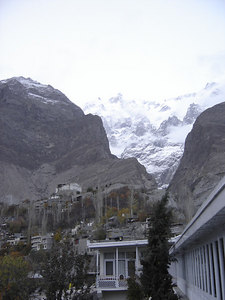
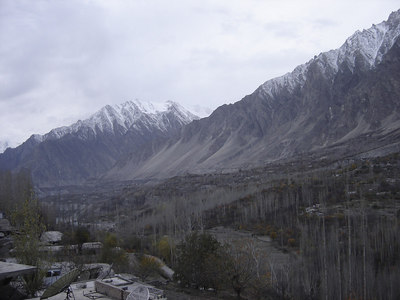
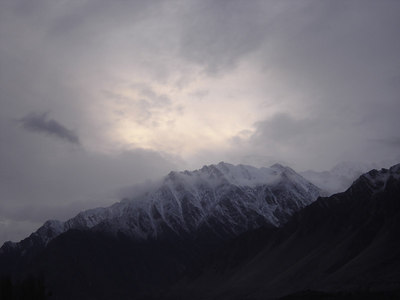
We spend three nights and each day wandering the village, chatting with it's inhabitants, especially the beautiful children.
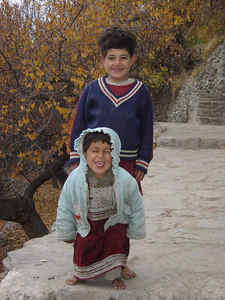
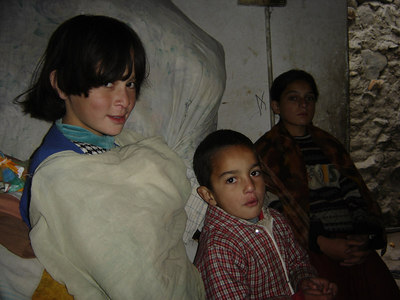
We also visit the Fort which is 780 years old.
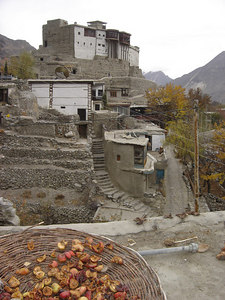
Our guide is a lovely young man complete with an economics degree but also a love for his Hunza history so we have a lovely afternoon. Sadly he tells us that only two hours ago the last Queen of Hunza passed away at the age of 96. Her funeral will be tomorrow.
The family (rulers of Hunza Province) lived in the fort up until 1945 and then moved to newer quarters in Karimabad.
When the Pakistani government daned that Hunza was no longer a separate province but part of Pakistan, the family became only figure heads with no say at all within the Pakistani government.
You cannot help but love this village, the people, the scenery and the way they live their lives. This branch of the Muslim religion is known as Ismali. Their leader the Aga Khan (Imam number 49) is a progressive man. The first thing you notice about this region compered to the South, are the people's faces, they are happy and animated. There are women in public and they do not all wear scarves. They are allowed to pray with the men in a community hall called a jamaat khana. Prayer is seen as a personal matter. The children all attend school and Hunza has one of the highest literacy rates in Pakistan. They also have basic health facilities and a little more infrastructure. And they seem to genuinely love the tourists.
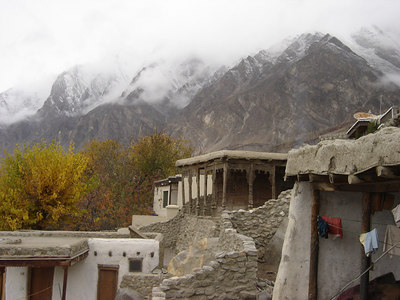
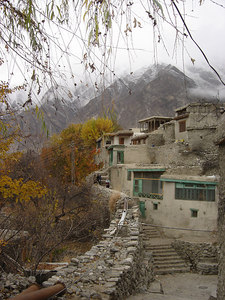
Before we start the return journey to Islamabad we head North without making it to the Khunjerab Pass, it is too late in the season and the road is far too icy. We pass the village of Pasu
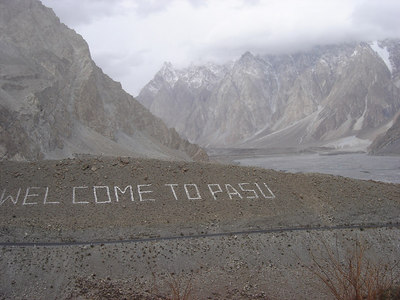
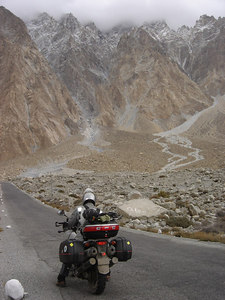
where we meet this lovely man herding his Yaks.
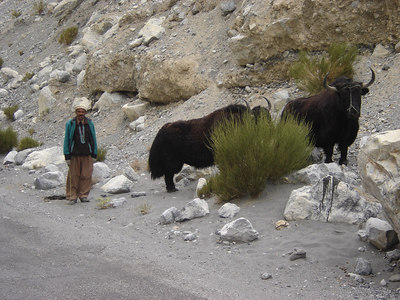
and actually get as far as Sost before turning around.
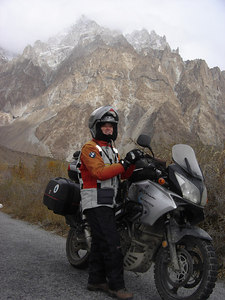
But for Skill, to have travelled even this much of the famous KKH has been the realisation of a 10 year dream. And you can see why.
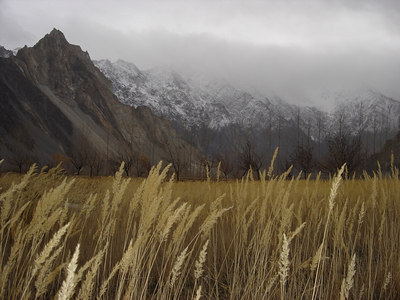
We return to Gilgit and stay a couple of days where we catch up with Marcus again. The weather has closed in and we are not keen to travel in the rain. So the bikes stay put at the friendly Madina Guest House.
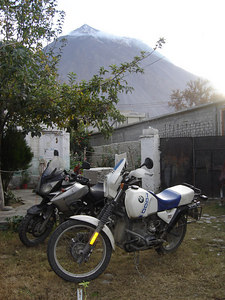
Marcus tells us about his visit to Fairy Meadows (cabins/camp high in the mountains near Nanga Parbat) and his desire to return. In the end we hatch a plan with 4 other travellers (including Patrick and Sophie our Dutch cycling friends from Iran who have turned up in Gilgit) to get to Fairy Meadows. Marcus, Skill and I ride to Raikot Bridge.
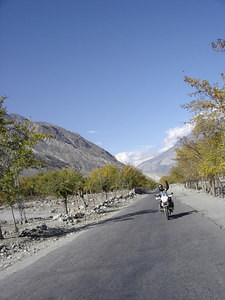
while Patrick and Sophie, Kevin and Caroline hitch a ride on the back of a 4WD Ute.
Marcus then bravely rides his bike up the incredibly steep and dangerous track to the village and organises a jeep to come back down to collect us all. We leave our bike in a lock up at the Bridge as its too difficult to ride this road with pillion and luggage.
The trip up in the jeep is indescribable. The track is only just wide enough for one vehicle and there is a sheer vertical drop into the valley of well over 400 metres. I am absolutely terrified as are most of our crew, what have we done? Most decide there and then to walk down!
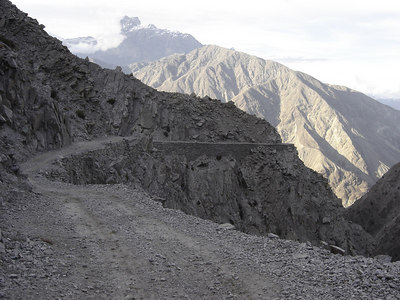
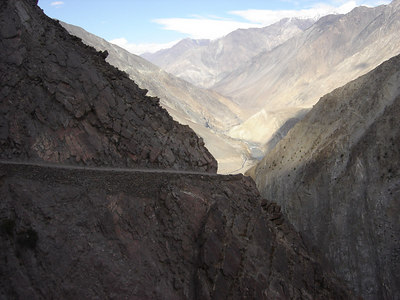
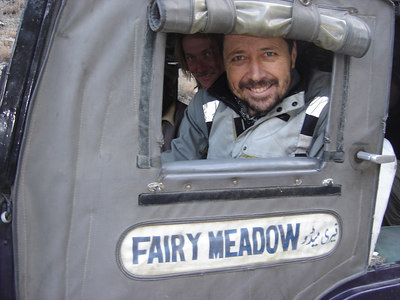
When we finally arrive at the village (I thank Allah) we meet our shotgun toting guides and then start our 2 and a half hour treck UP the mountain to the camp. If someone had told me that I would be trekking in the Western Himalayas during twilight into the pitch black evening I would have told them not to be crazy. As we walk along we can hear avalanches on the mountain We are like the seven dwarfs all with our headlights, it is hard work but at the same time exhilarating. Up and up we go reaching the snow line which we trek through for half an hour. We arrive at about 7pm, tierd but excited, light a fire to warm the very basic cabin and our guides prepare our dinner.
We are all pretty weary so bunk down as soon as dinner is finished. In the morning this is what we can see from our bed. Dawn over the eighth highest peak in the world. Not something we will ever forget.
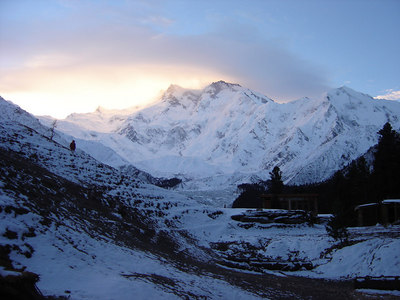
Out of bed and we are witness to an avalanche coming in a huge wave down the mountain, in the distance of course.
We spend an idyllic day in this majestic setting, chatting, eating and reveling in our good fortune having such a place all to ourselves - oh and trying to keep warm.
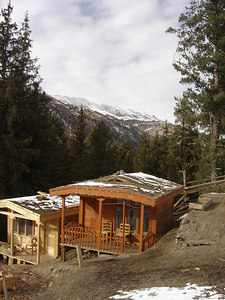
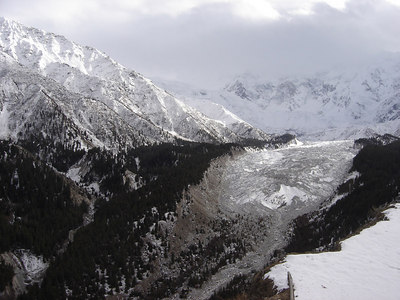
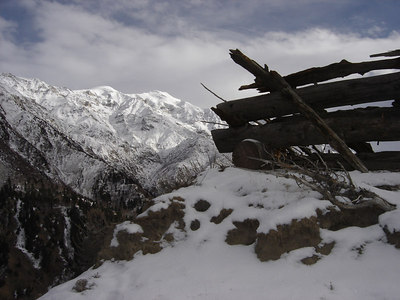
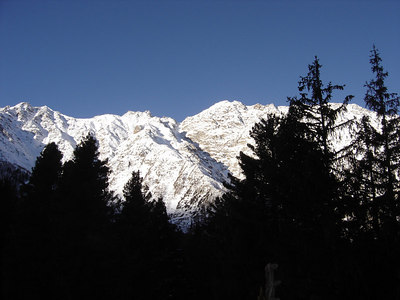
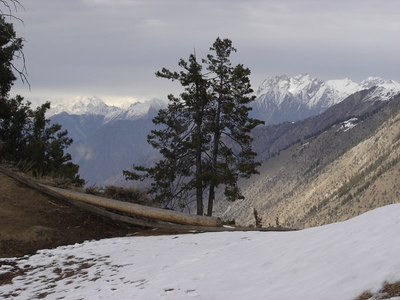
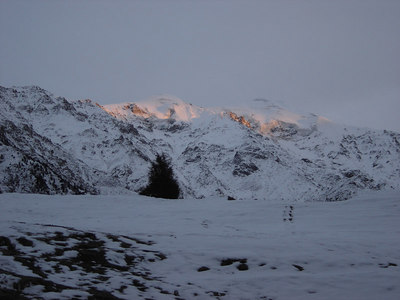
In the afternoon the guides tell us they are off to hunt down our dinner. They return a couple of hours later with "Mountain Chickens" which they turn into a scrumptious soup and curry.
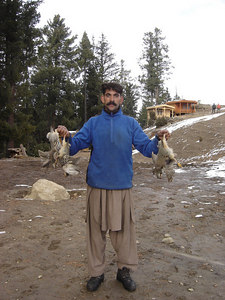
Marcus and Patrick inspired by their success take the shotgun and go on their own expedition. It is a fruitless one but they are very excited to have fired a gun for the first time in their lives. They both confess they could not have shot a living creature anyway.
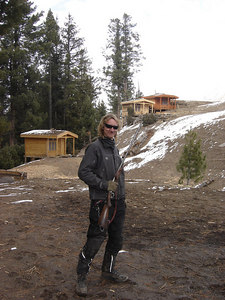
Once again we witness a spectacular sunset over the "Killer Mountain" so called because of the number of people killed trying to climb it. No doubt this is due to its sheer, near vertical sides so steep that little snow sticks, giving its name Nanga Parbat meaning naked mountain.
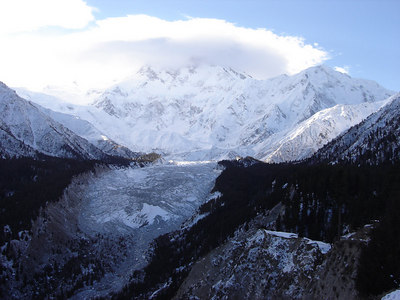
Next morning we leave and hike down the mountain to the village.
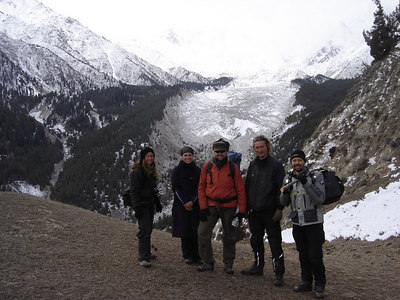
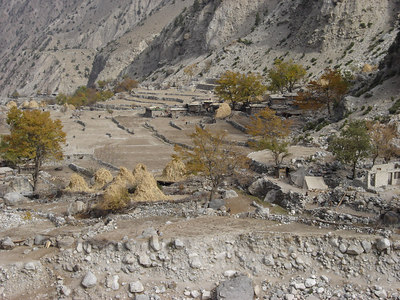
Once back at the village Marcus rides down, Kevin bales out and catches a lift on an overloaded, log laden jeep while Patrick, Sophie, Caroline, Skill and I start the 15km journey down.
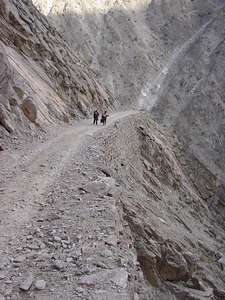
Skill and I both have trouble with our boots and are sliding forward in them, at one point I do the old stumble trip thing and really hurt my big toe. (I later learn it is broken)
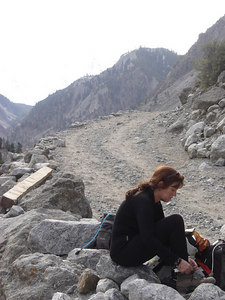
And Skill has shin splints, and there is still only 10 kilometres to go! By the time we reach the bottom we have walked more than 20 strenuous kilometres and over 2000m vertical. We are absolutely wrecked, keeping in mind we have done little exercise for eight months.
We say Goodbye to Patrick and Sophie and Caroline as they hitch a ride with some goat herders in their jeep back to Gilgit.
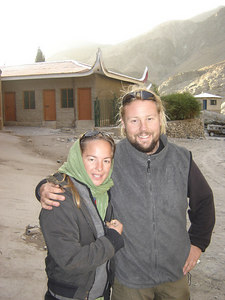
We repack the bike and make the 80 minute ride back to Chilas breaking our golden rule and arriving just after dark. We opt for the upmarket Shangri-La Resort, the promise of hot water and room service is too much to resist. We are absolutely exhausted and take full advantage of this little bit of luxury.
In the morning I can barley move and have a great deal of trouble getting on the bike. I say to Skill "Next time I decide to walk 20 kms down a mountain remind me I am over 40, not a bloody 20 year old!"
We ride back to Besham often stopping to admire one of the many suspension bridges and the Indus. Later in the day we are stopped twice by landslides, the KKH workers are quickly on the job clearing a path through the rocks and dirt.

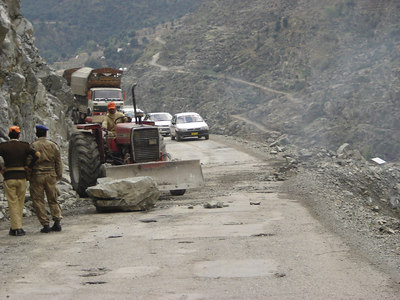
Being gluttons for punishment we stay in the same place as before, at least we have hot water and the food is passable.
Next day it is shorter ride to Mansehra through lots of earthquake ravaged areas. A lot of villages are still tent villages.
I also get out the camera to take photos (sorry they are blurred) of the overloaded vehicles, which are an essential part of KKH. No truck, car, van, bus or autorickshaw is ever too full. There is always room for more cargo or passengers.
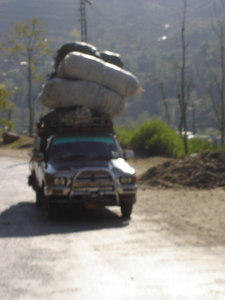
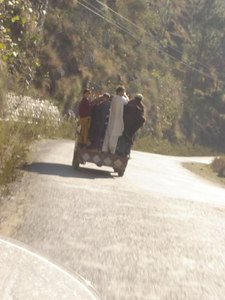
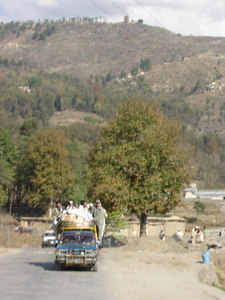
We have an early finish and stay at the Karakoram Hotel in Mansehra again. Next morning the skys have cleared and there are glorious views to the snow capped mountains.
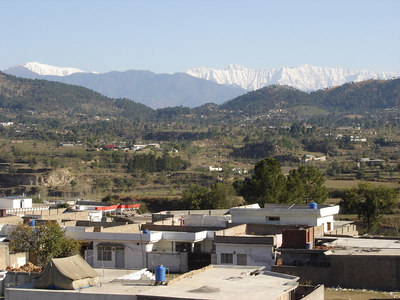
A short day back to Islamabad, but for some reason the traffic is more dreadful than normal, we witness three accidents. In Islamabad we do the rounds of the hotels, we are ready to give up and pay the fortune they want for a semi decent room when we happen upon a guest house which is a better option for us.
We are also early enough to pick up our passports from the Indian Embassy. We are all ready to do battle with the security police at the entrance to the Embassy Enclave but they just wave us through. We cannot work them out. Passports collected we venture out to the Marriott for take away beers and all is good in the world.
The following day Skill heads out to the Post Office to collect our mail my sister has sent while I do the mountains of washing. He is gone for hours. When he arrives back he explains that nobody actually knew where the Poste Restante mail was kept and sent him from one Post Office to the next until he finally ended up in Rawapindi 15 km away.
As chance would have it he happened to bump into (literally) the equivalent of "The Post Master General" for Islamabad/Rawapindi area who was none to pleased with his underlings incompetence so he told Skill to follow his car back to Islamabad which he did, he then sat in a huge office drinking tea with this man while his staff ran in circles to track down our letter. Finally after 4 hours, success.
That afternoon we go to get on the bike and it won't start (the first bike glitch in 8 months), so the guys at the guest house take Skill to the battery shop where they put it on the charger overnight. Next morning the battery has not taken a charge and is deemed to be dead so we purchase a new one.
As I said the first glitch in eight months and the battery is good enough to die on us in a major centre where we have access to facilities, you can't ask for more than that.
We spend 2 more nights in Islamabad just catching up with jobs, bike washing and bike oil change and fortifying ourselves for the journey to the border.
It is a long days ride to Wagh, we get completely lost in Lahore, but arrive just in time to check into the passable Wagh PTDC Hotel before heading to the famous border closing ceremony. This is where the Pakistani and Indian Armies in all their pageantry try to outmarch, outyell, and outscowl and outstamp each other. It is absolutely hilarious. Hundreds of people from both sides of the border come each night to watch this event. They have even built grandstands to house the spectators.
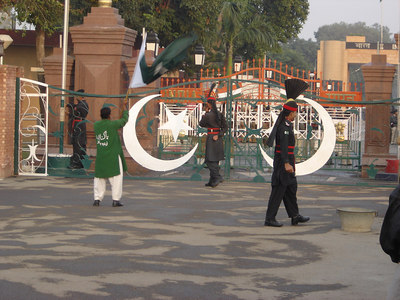
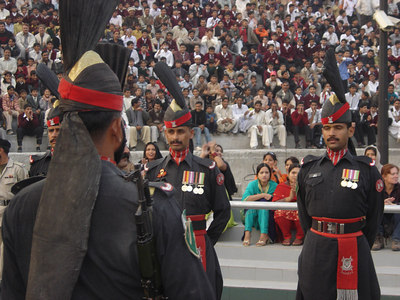
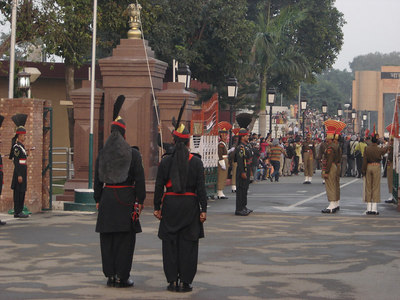
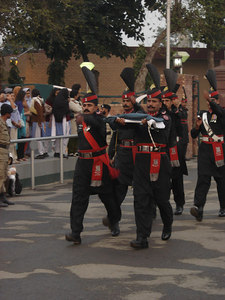
We enjoy the spectacle before an early night. Tomorrow we leave Pakistan and it will be onto India and the ancient Seik city of Amritsar.
I would be lying if I said Pakistan is an easy country to travel in. It is not.
Every day is a challenge, the traffic mayhem, the rubbish, the dirty hotels, the lack of facilities and the sometimes non existent infrastructure. The way women are not seen in public and are completely dominated by a male run society. But in my opinion it is a SAFE country to travel in and truly worth the effort. Our KKH experience will be a highlight of our entire journey.
Pakistan is in a troubled part of the world, and is bordered by some of the most dangerous and turbulent regions in the world, Kashmir and Afghanistan. Life for Pakistan's citizens is difficult
It is a poor country and most people do not have a lot, but what they do have, they will happily and willingly share with you. They are very honest, kind, gentle and giving people. We NEVER felt unsafe or threatened, quite the opposite, and the authorities were beyond reproach. The vast majority of these people want, what we in the West want, a peaceful existence, prosperity and a better way of life for their children.
Lets hope they can achieve it.
Cheers and Chai
Quote for the week: "If you don't know where you are going, any road will lead you there" - Unknown
PS Below is the latest Australian DFAT Travel Advice for Pakistan, which was updated after we had entered Pakistan.
While I do not recommend flouting DFAT warnings sometimes it is far better to make educated and informed decisions on the ground. Our best source of knowledge came from other travellers who had just made the journey, thanks to Raoul and Dave and Rose for their advice.
Our other rule of thumb for travelling, is to stay away from Western Hotels (which we can't afford anyway) and not eat in Western take aways. (Although we did have Pizza Hut Pizza, sometimes you just got to have beer and pizza)
Australian DFAT Warning: Thursday Nov 23 20:55 AEDT
The Department of Foreign Affairs and Trade (DFAT) says militants may
be planning an attack on Australians within the Pakistani city of
Peshawar.
The threat is reported in the department's latest Pakistan travel
advisory.
"Recent reports suggest that terrorists are planning attacks against
Western, including Australian, individuals and interests in Peshawar,"
the warning says.
Peshawar, on the edge of the Khyber Pass, is the financial capital of
Pakistan's troubled north-western frontier. DFAT has long urged
Australians to take extra precautions in the city.
The advisory also warns of the possibility of an attack outside
Peshawar.
"Recent credible reporting indicates a potential terrorist threat
against Western hotels in Islamabad," the warning says.
"If you do decide to travel to Pakistan, you should exercise extreme
caution.
"We continue to receive reports that terrorists are planning attacks
against a range of targets, including places frequented by foreigners."
Pakistan is considered an ally in the so-called war on terror, but its
porous border with Afghanistan has been problematic in the fight
against Islamist militants.
The last major attack on Western interests in Pakistan was the March 2
bombing of the US consulate which killed four people including a US
diplomat.
The overall level of advice from DFAT for Pakistan remains unchanged at
"reconsider your need for travel" while areas bordering India and
Afghanistan are listed as "do not travel".
"We strongly advise you not to travel to Baluchistan, the
federally-administered tribal areas, and areas adjacent to Pakistan's borders with
Afghanistan and India ... due to the volatile security environment.
"If you are in these areas you should consider leaving."
